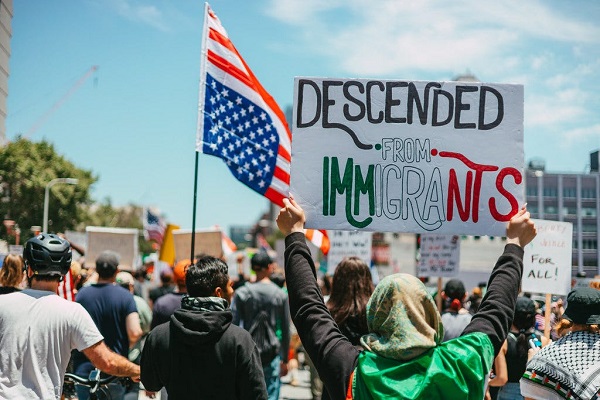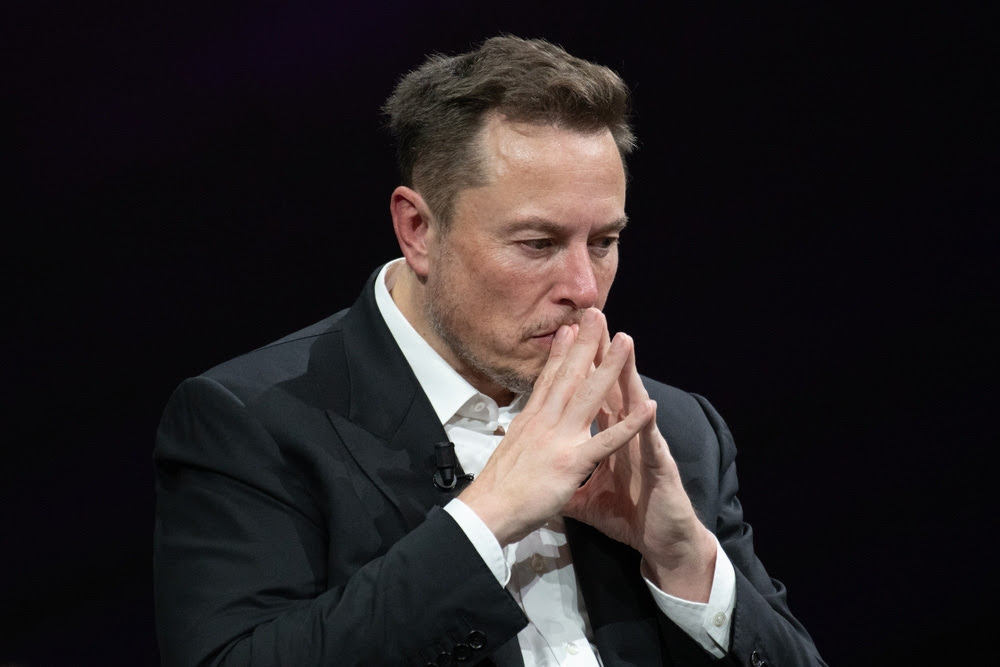Christopher Rufo
How Gender Ideology Captured the State Department

|

|
In a job posting for a security escort position at the U.S. Consulate General in Lagos, for example, applicants are told that “[t]he U.S. Mission in Nigeria supports Diversity, Equity, Inclusion and Accessibility (DEIA),” and that “[a]ll genders are welcome to apply.” Some two-thirds of the job summary is dedicated to DEI, as if U.S. security officers should be more concerned with gender pronouns than terrorist attacks.
The U.S. Department of State is charged with advancing American interests abroad through complex and delicate diplomatic missions, as well as maintaining the safety of those missions and the Americans serving them.
The institution’s lodestar should be the national interest, but under President Joe Biden, the State Department has demoted that critical objective in favor of a new global agenda: to spread radical gender theory to foreign nations.
The shift began at the top. President Biden and, in turn, the apparatus beneath him led America’s leftward charge on the world stage. Upon taking office in 2021, the administration used the previous year’s racial unrest as a pretext to issue a slew of executive orders and memoranda entrenching left-wing ideologies in all levels of the federal government, under the guise of “diversity, equity, and inclusion,” or DEI.
As part of this initiative, the White House required each federal agency to submit detailed DEI progress reports regularly, appoint a chief diversity officer, and create “Agency Equity Teams,” whose leaders were tasked with “delivering equitable outcomes.” These requirements contributed to what the president called “an ambitious whole-of-government equity agenda.”
The gender component of this agenda spread to the State Department through the president’s “Memorandum on Advancing the Human Rights of Lesbian, Gay, Bisexual, Transgender, Queer, and Intersex Persons Around the World.” Published in February 2021, this memorandum directed State and other agencies to monitor closely and report on the “LGBTQI+” policies of our allies, to “broaden the number of countries willing to support and defend” the radical Left’s understanding of gender—for example, by funding pro-transgender “civil society advocates” in order to shift public opinion in those countries—and to tie in the principles of gender theory to America’s foreign-aid programs.
If necessary, the memo maintained, agencies should use “the full range of diplomatic and assistance tools” to ensure foreign governments’ compliance with this agenda, including “financial sanctions, visa restrictions, and other actions.”
The policy’s most visible expression was Secretary Antony Blinken’s 2021 authorization allowing American embassies to fly rainbow flags. This symbolic gesture was just the tip of the iceberg, however. Under Blinken’s leadership, State has woven critical theory into the fabric of America’s foreign policy. “I want to be crystal clear about this,” the secretary said upon appointing the agency’s first chief diversity officer in June 2021. “Promoting diversity and inclusion is the job of every single member of this department. It’s mission critical.”
To that end, Blinken spearheaded the adoption of an internal diversity plan that commits the department to hiring “a workforce that reflects the diversity of the United States . . . and implementing a comprehensive recruitment plan that targets underrepresented groups”; conducting a sophisticated “DEIA Climate Survey”; and, bizarrely, producing a “crowdsourced digital storytelling campaign” called #FacingDiplomacy, a self-flagellating chronicle of “the historic impact of discrimination in the Department.”
Material incentives ensure compliance with this official ideology: the “advancement of DEIA” is now considered “as an element for all employees as part of their job performance criteria, career advancement opportunities, and senior performance pay.”
The heart of the department’s effort, though, is not to increase adherence at home but to spread it abroad. State recruited a cadre of gender activists to entrench these theories into foreign policy.
One key figure is gender activist Jessica Stern, whom the president appointed as special envoy to advance the human rights of LGBTI+ persons. She was previously the executive director of OutRight Action International, helped to found the United Nations LGBTI Core Group, and was responsible for the first UN resolution to include the term “gender identity.”
Another key figure is Zakiya Carr Johnson, who stepped in as the department’s chief diversity officer earlier this year. Like Stern, Johnson also has a history of activism, having spent six years at a left-wing NGO in Brazil, as well as at other “inclusive” organizations, such as Atlantic Fellows, ODARA Solutions, and her own start-up, Black Women Disrupt.
These women are not figureheads. They aggressively press gender theory into foreign policy. Johnson, in particular, regularly promotes the State Department’s ideological agenda on social media, spotlighting her exchange with the Brazilian high representative for gender issues, meeting with the Chilean ambassador to applaud his “#FeministForeignPolicy,” or speaking at the Colombian embassy about “diversity” and “inclusion.”
The diversity agenda has been translated to the day-to-day operations at embassies around the world. Some embassies are even screening security positions for adherence to DEI. In a job posting for a security escort position at the U.S. Consulate General in Lagos, for example, applicants are told that “[t]he U.S. Mission in Nigeria supports Diversity, Equity, Inclusion and Accessibility (DEIA),” and that “[a]ll genders are welcome to apply.” Some two-thirds of the job summary is dedicated to DEI, as if U.S. security officers should be more concerned with gender pronouns than terrorist attacks.
Inside the embassies, gender has become a near obsession. State’s latest annual LGBTQI+ progress report lists countless present and future efforts across all foreign agencies to make the world safe for queer theory, from “Pride Events at Headquarters” to “Gender Equity in the Mexican Workplace.” Among these is a department-wide partnership with the Global Equality Fund, a public-private entity “dedicated to advancing and defending the human rights of LGBTQI+ persons around the world” that has directed funds to 116 “grassroots” LGBTQI+ organizations in 73 countries.
State itself asserts that U.S. diplomatic efforts should reflect progressive ideology. In a special report on “DEIA Promotion” by the department’s advisory commission on public diplomacy, State evaluates “how U.S. missions adapt existing programs to DEIA principles,” which are to inform “all aspects of the Department’s policymaking as well as efforts to address barriers to opportunity for individuals historically and currently burdened by inequality and systemic discrimination.” Realpolitik, in other words, should give way to critical theory.
These efforts raise a critical question: Does gender theory advance the U.S.’s national interests? The answer appears to be no. But that is hardly an obstacle for State’s gender activists. They want to hang the rainbow flag throughout the benighted parts of the world. This mission trumps all others.
Christopher Rufo is a reader-supported publication. To receive new posts and support my work, consider becoming a free or paid subscriber.
This article was originally published in City Journal
Christopher Rufo
The “No Kings” Protest Is Pure Fantasy

 Christopher F. Rufo
Christopher F. Rufo
The underlying theory is that Donald Trump is an authoritarian leader on the cusp of becoming king.
I spent Father’s Day weekend in Hood River, Oregon, and stumbled upon the local “No Kings” anti-Trump protest. The crowd was populated mostly by Baby Boomers, who appeared to be living out a political fantasy, in which they could “stop fascism” by reenacting the protest movements of their youth. One sign, typical of the genre, derided Trump as a “felon, rapist, con man”; another riffed on Mary Poppins, reading “super callous, fragile, racist, sexist, Nazi POTUS.”
The underlying theory of this protest, which reportedly drew upward of 5 million demonstrators nationwide, is that Donald Trump is an authoritarian leader on the cusp of becoming king. The only way to stop him is to flood the streets and persuade the American people that Trump is a rotten character with despotic ambitions.
The theory, of course, is nonsense. Trump is a duly elected president. He is working with Congress on the budget. His deportation policy, which lent momentum to the weekend’s demonstrations, is predicated on enforcing existing law. Though President Trump contested the results of his first reelection campaign, he ultimately relented and peacefully transferred power to President Joe Biden—hardly the behavior of a tyrant.
Yet the protests are not without utility for the Left. They are not intended to grapple with the reality of the Trump presidency but to submerge reality in fantasy. The first step in entrenching the Left’s fictions in the public mind is to cultivate a sense of hysteria. In the president’s first term, crowds wore vagina-shaped hats and marched in the bitter cold. The tone of the “No Kings” protest was no less absurd, with women in Handmaid’s Tale costumes warning that Trump would reduce them to sex slaves.
The next step is to turn public energy into a threat. As seen in Los Angeles earlier this month, the Left’s more aggressive factions can operate alongside “mostly peaceful protests,” aiming to provoke law enforcement into overreacting. During Trump’s first term, leftist activists often played a double game—promoting “nonviolent” demonstrations for women’s rights or racial justice while allowing more confrontational elements to intimidate Trump supporters.
This time, immigration is the flash point. Trump has tied his presidency to mass deportations. The Left believes it can stop him by carefully shaping public opinion. That means highlighting emotional—if sometimes misleading—stories of deportation victims and sympathetic portrayals of protesters clashing with National Guard troops. These narratives are designed to paint Trump as an authoritarian and the Left as the resistance, with the aim of driving his approval ratings low enough to weaken his presidency.
The irony is that Trump does not have the power of a king—or, arguably, even the full power of the presidency, as established in Article II of the Constitution. District courts have blocked many of his policies down to the most minute detail, sometimes within hours of their adoption. A federal judge even prohibited the administration from removing gender-related content from government websites.
At the Hood River protest, I noticed a generational divide. The Baby Boomers were the most gullible, engaging in 1960s protest nostalgia and genuinely believing that America was under threat of incipient fascism. The younger generation, which came to political consciousness during the Trump era, seemed more skeptical. At the edge of the protest, I saw a group of teenage boys holding signs that read “Ban Onions” and “Ban Scratchy Blankets.” They seemed to see through the fiction of “No Kings,” viewing left-wing Baby Boomers, rather than Trump, as the rightful targets of satire and rebellion.
I hope that this attitude prevails. For 60 years, the Boomers have held a grip on the American political narrative; it has not been a story that conduced to national well-being. America elected Trump, in part, to demolish the remaining fantasies of the 1968 generation. Yes, no kings—and no more lies.
Invite your friends and earn rewards
Business
Washington Got the Better of Elon Musk

The tech tycoon’s Department of Government Efficiency was prevented from achieving its full reform agenda.
It seems that the postmodern world is a conspiracy against great men. Bureaucracy now favors the firm over the founder, and the culture views those who accumulate too much power with suspicion. The twentieth century taught us to fear such men rather than admire them.
Elon Musk—who has revolutionized payments, automobiles, robotics, rockets, communications, and artificial intelligence—may be the closest thing we have to a “great man” today. He is the nearest analogue to the robber barons of the last century or the space barons of science fiction. Yet even our most accomplished entrepreneur appears no match for the managerial bureaucracy of the American state.
Musk will step down from his position leading the Department of Government Efficiency at the end of May. At the outset, the tech tycoon was ebullient, promising that DOGE would reduce the budget deficit by $2 trillion, modernize Washington, and curb waste, fraud, and abuse. His marketing plan consisted of memes and social media posts. Indeed, the DOGE brand itself was an ironic blend of memes, Bitcoin, and Internet humor.
Three months later, however, Musk is chastened. Though DOGE succeeded in dismantling USAID, modernizing the federal retirement system, and improving the Treasury Department’s payment security, the initiative as a whole has fallen short. Savings, even by DOGE’s fallible math, will be closer to $100 billion than $2 trillion. Washington is marginally more efficient today than it was before DOGE began, but the department failed to overcome the general tendency of governmental inertia.
Musk’s marketing strategy ran into difficulties, too. His Internet-inflected language was too strange for the average citizen. And the Left, as it always does, countered proposed cuts with sob stories and personal narratives, paired with a coordinated character-assassination attempt portraying Musk as a greedy billionaire eager to eliminate essential services and children’s cancer research.
However meretricious these attacks were, they worked. Musk’s popularity has declined rapidly, and the terror campaign against Tesla drew blood: the company’s stock has slumped in 2025—down around 20 percent—and the board has demanded that Musk return to the helm.
But the deeper problem is that DOGE has always been a confused effort. It promised to cut the federal budget by roughly a third; deliver technocratic improvements to make government efficient; and eliminate waste, fraud, and abuse. As I warned last year, no viable path existed for DOGE to implement these reforms. Further, these promises distracted from what should have been the department’s primary purpose: an ideological purge.
Ironically, this was the one area where DOGE made major progress. In just a few months, the department managed to dismantle one of the most progressive federal agencies, USAID; defund left-wing NGOs, including cutting over $1 billion in grants from the Department of Education; and advance a theory of executive power that enabled the president to slash Washington’s DEI bureaucracy.
Musk also correctly identified the two keys to the kingdom: human resources and payments. DOGE terminated the employment of President Trump’s ideological opponents within the federal workforce and halted payments to the most corrupted institutions, setting the precedent for Trump to withhold funds from the Ivy League universities. At its best, DOGE functioned as a method of targeted de-wokification that forced some activist elements of the Left into recession—a much-needed program, though not exactly what was originally promised.
Ultimately, DOGE succeeded where it could and failed where it could not. Musk’s project expanded presidential power but did not fundamentally change the budget, which still requires congressional approval. Washington’s fiscal crisis is not, at its core, an efficiency problem; it’s a political one. When DOGE was first announced, many Republican congressmen cheered Musk on, declaring, “It’s time for DOGE!” But this was little more than an abdication of responsibility, shifting the burden—and ultimately the blame—onto Musk for Congress’s ongoing failure to take on the politically unpopular task of controlling spending.
With Musk heading back to his companies, it remains to be seen who, if anyone, will take up the mantle of budget reform in Congress. Unfortunately, the most likely outcome is that Republicans will revert to old habits: promising to balance the budget during campaign season and blowing it up as soon as the legislature convenes.
The end of Musk’s tenure at DOGE reminds us that Washington can get the best even of great men. The fight for fiscal restraint is not over, but the illusion that it can be won through efficiency and memes has been dispelled. Our fate lies in the hands of Congress—and that should make Americans pessimistic.
Subscribe to Christopher F. Rufo.
For the full experience, upgrade your subscription.
-

 International2 days ago
International2 days agoSecret Service suspends six agents nearly a year after Trump assassination attempt
-

 Bruce Dowbiggin1 day ago
Bruce Dowbiggin1 day agoThe Covid 19 Disaster: When Do We Get The Apologies?
-

 Crime22 hours ago
Crime22 hours agoSweeping Boston Indictment Points to Vast Chinese Narco-Smuggling and Illegal Alien Labor Plot via Mexican Border
-

 Alberta1 day ago
Alberta1 day agoAlberta school boards required to meet new standards for school library materials with regard to sexual content
-

 Business2 days ago
Business2 days agoWEF-linked Linda Yaccarino to step down as CEO of X
-

 Automotive2 days ago
Automotive2 days agoAmerica’s EV Industry Must Now Compete On A Level Playing Field
-

 Environment22 hours ago
Environment22 hours agoEPA releases report on chemtrails, climate manipulation
-

 Business2 days ago
Business2 days ago‘Experts’ Warned Free Markets Would Ruin Argentina — Looks Like They Were Dead Wrong



